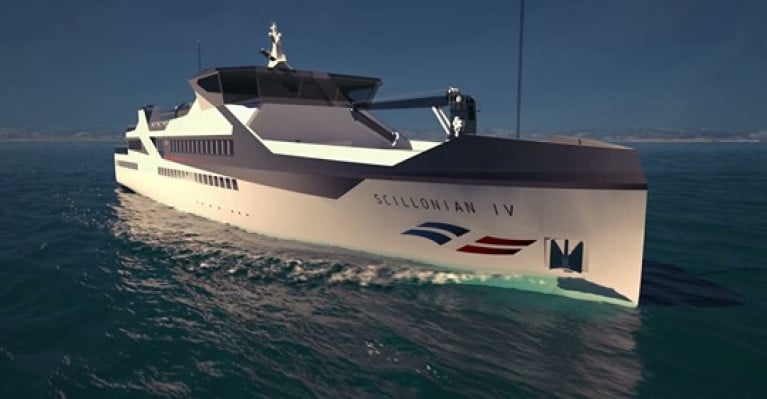Displaying items by tag: CornwallScilly
Cornwall: Isles of Scilly Steamship Co. Reveal Designs for New Passenger Ferry & Cargoship
As Afloat previously reported, plans to replace the Isles of Scilly Steamship Company’s veteran Scillionian III, with designs for a new state-of-the-art passenger ferry and cargoship were recently revealed for the first time.
Currently the Scillonian III connects Penzance, Cornwall in south-west England to St. Mary's, the largest and most populous island of the archipelago. The vessel launched in 1977 from Appledore Shipbuilders in neighbouring Devon, operates the 2 hours 45 minutes island life-line link.
Following an extensive consultation process with the Isles of Scilly community, the striking new 72m passenger ferry (video) will carry 600 passengers over three decks with a contemporary, comfortable seating arrangement, an onboard coffee shop and retail area.
According to the Isles of Scilly Steamship, the newbuild will be capable of a speed of 18 knots, reducing journey time by 20%; anti-roll fins to improve the stability of the crossing; increased cargo capacity with the ability to carry chilled and frozen goods; improved access for passengers with reduced mobility. A hybrid propulsion system for the new passenger cargoship is to reduce emissions.
In addition a 45m dedicated cargo ship is to replace the Gry Maritha, will have an increased cargo capacity, including more space for chilled and frozen goods; a crane which can lift eight tonnes and a comfortable lounge for up to 12 passengers.
The new inter-island launch will be capable of 12 knots, allowing for significantly faster journey times between St Mary’s and the off-islands; a 50% increase in cargo capacity and will have a reduced fuel consumption of 55%.
The next step will be entering discussions with shipyards on potential build programmes. The company has partnered with international shipbroker Blair Reid, which specialises in the sale and procurement of new ferries.
Blair Reid is currently in contact with 32 shipyards across the UK, Europe and the Far East to acquire Expressions of Interest and to identify potential build slots and build cost.
Stuart Reid, Chief Executive said: “We have carried out an extensive consultation process and we have listened to what the Isles of Scilly community have identified as priorities in improving the service. Their needs have been at the forefront of the design process. We are proud of the proposals, which will ultimately enhance the excellent cargo and passenger services we operate today and serve generations of travellers for years to come.”
The design, in partnership with naval architects BMT, involved consultation with islanders and stakeholders last summer. It found resilience, reliability, journey time and affordability to be the most important factors for future services.
Ian Howard, Chairman said: “We have taken a major step towards the future with the finalisation of these designs. Now we must select the right yard(s) to build these vessels and secure finance for them.”
Kevin George, Director said: “Green technology is at the heart of the new designs; we aspire to minimise environmental impact at the earliest opportunity whilst ensuring the reliability and resilience of this vital lifeline service.
“In future, we want to have the ability to adapt and modify the chosen propulsion system to ensure we meet the Government’s target of decarbonisation of the marine sector by 2050 and to keep the vessels aligned with evolving environmentally friendly technology.”
Sylvain Julien, Director of Naval Architecture at BMT, said: “BMT is committed to leading the way in designing vessels that reduce the environmental footprint, and we welcome the opportunity to work in partnership with ISSG and the island community to work towards enhanced operations and increased sustainability by leveraging our deep understanding of advanced ferry designs.”
The Company is currently working with the Council of the Isles of Scilly and Government on financing options.





























































